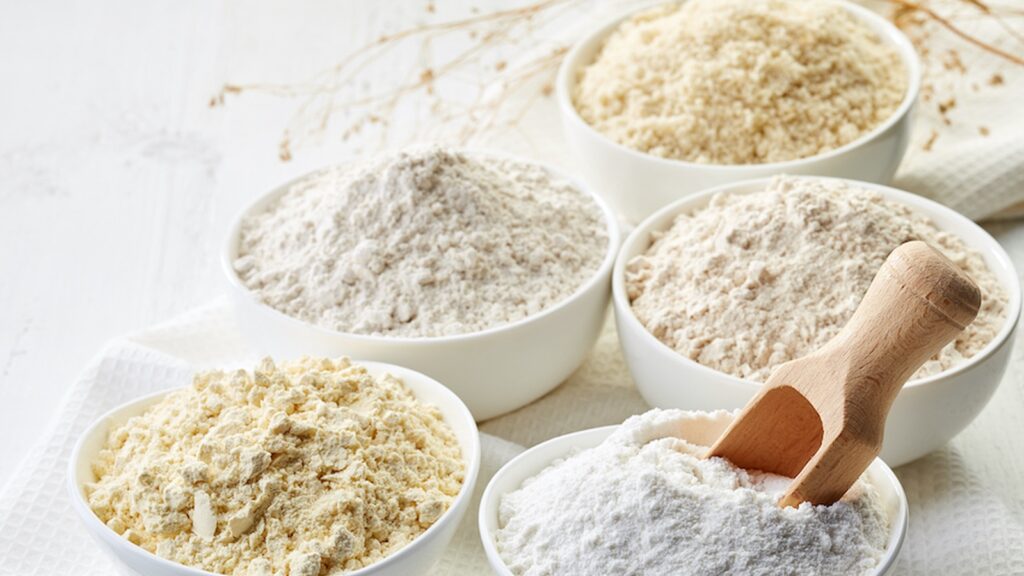Title: 5 of the Healthiest Flours for Every Purpose: A Comprehensive Guide
Introduction:
When it comes to baking and cooking, flour is a staple ingredient used in various recipes. However, not all flours are created equal in terms of nutritional value. In this comprehensive guide, we will explore five of the healthiest flours available, highlighting their benefits and suggested uses. By incorporating these flours into your culinary adventures, you can enhance the nutritional quality of your dishes without compromising on taste or texture.
1. Almond Flour:
Almond flour is made from blanched almonds that are ground into a fine powder. It is naturally gluten-free and rich in healthy fats, protein, fiber, and essential nutrients. Almond flour offers a range of benefits, including promoting heart health, managing blood sugar levels, and aiding in weight management. It has a slightly sweet and nutty flavor, making it an excellent choice for baked goods like cookies, cakes, and muffins. Almond flour can also be used as a coating for meat or fish, providing a gluten-free alternative to breadcrumbs.
2. Coconut Flour:
Derived from dried coconut meat, coconut flour is another nutritious option. It is high in fiber and low in carbohydrates, making it suitable for individuals following a low-carb or ketogenic diet. Coconut flour contains healthy fats, iron, and antioxidants, contributing to improved digestion, stable blood sugar levels, and a boosted immune system. Due to its high fiber content, coconut flour absorbs more liquid than other flours, so recipes may require additional moisture. It is ideal for baking bread, pancakes, and desserts like coconut macaroons.
3. Quinoa Flour:
Quinoa flour is produced by grinding quinoa seeds into a fine powder. Quinoa is a complete protein, meaning it contains all nine essential amino acids, making it an excellent choice for vegetarians and vegans. Quinoa flour is gluten-free and rich in fiber, iron, and magnesium. It has a slightly earthy and nutty flavor, which adds a unique taste to your dishes. Quinoa flour works well in a variety of recipes, including bread, pizza dough, and pancakes. Additionally, it can be used as a thickening agent in soups, stews, and sauces.
4. Buckwheat Flour:
Despite its name, buckwheat is not related to wheat and is entirely gluten-free. Buckwheat flour is milled from the seeds of the buckwheat plant and offers a wide range of health benefits. It is rich in fiber, protein, and essential minerals like manganese and magnesium. Buckwheat flour is known to support heart health, regulate blood sugar levels, and aid digestion. It has a slightly nutty and earthy flavor. This flour is excellent for making pancakes, waffles, noodles, and crepes, adding a distinctive taste and texture to your dishes.
5. Whole Wheat Flour:
While many people are familiar with all-purpose flour, it lacks the nutritional value found in whole wheat flour. Whole wheat flour is made by grinding the entire wheat kernel, providing higher fiber content, essential vitamins, minerals, and antioxidants. This flour is a good source of complex carbohydrates and offers sustained energy release. Whole wheat flour is ideal for baking bread, muffins, cookies, and other baked goods. It adds a slightly denser texture and a nutty flavor to your recipes.
Conclusion:
By incorporating these five healthy flours into your cooking and baking endeavors, you can enhance the nutritional value of your meals without compromising taste or texture. Almond flour, coconut flour, quinoa flour, buckwheat flour, and whole wheat flour offer a range of health benefits, including increased fiber intake, improved heart health, regulated blood sugar levels, and enhanced digestion. Experiment with these flours in your favorite recipes to discover new flavors and textures while nourishing your body with wholesome ingredients. Remember to consider personal dietary restrictions and allergies before making any substitutions, and enjoy the journey of exploring healthier alternatives in your culinary creations.

